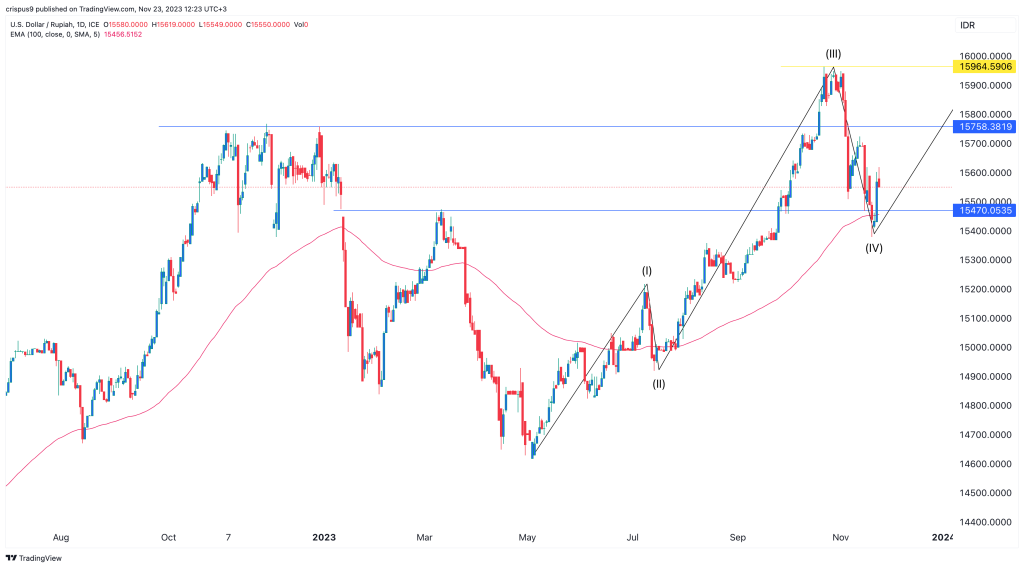Indonesia's Falling Reserves: Analyzing The Impact Of Rupiah Weakness

Table of Contents
Factors Contributing to Falling Foreign Exchange Reserves in Indonesia
Several interconnected factors contribute to the dwindling foreign exchange reserves in Indonesia. These factors highlight the complex interplay of global and domestic economic forces impacting the nation's currency and financial stability.
Reduced Export Earnings
A significant contributor to falling reserves is the decline in export revenue. This reduction stems from a confluence of global economic headwinds and reduced international demand for Indonesian commodities.
- Specific Commodities Affected: The decline in global demand for palm oil, coal, and rubber has significantly impacted export earnings. These commodities historically constituted a substantial portion of Indonesia's export revenue.
- Impact of Global Trade Wars and Protectionist Policies: Escalating trade tensions and protectionist measures implemented by various countries have further dampened export demand, limiting Indonesia's access to key international markets. This has created uncertainty and reduced the competitiveness of Indonesian goods in the global marketplace.
Increased Import Spending
Simultaneously, increased import spending has exacerbated the pressure on Indonesia's foreign exchange reserves. The nation's reliance on imported goods, coupled with rising global commodity prices, has led to a widening trade deficit.
- Key Imported Goods: Indonesia's dependence on imported capital goods, raw materials, and consumer goods contributes significantly to the import bill. Fluctuations in global prices for these goods directly affect the nation's trade balance.
- Vulnerability to Global Price Fluctuations: The Indonesian economy remains vulnerable to fluctuations in global commodity prices. Rising energy and food prices, for example, directly impact import costs and put pressure on the Rupiah.
Capital Outflows
Reduced foreign investment and capital flight represent another key factor contributing to the decline in reserves. Several factors contribute to this outflow of capital.
- Reasons for Capital Flight: Global economic uncertainty, interest rate differentials favoring other investment destinations, and concerns about political and economic stability in Indonesia all contribute to capital flight. Investors often seek safer havens during periods of economic turmoil.
- Impact of Geopolitical Risks and Regional Instability: Geopolitical risks and regional instability can also deter foreign investment, leading to capital outflows and putting further pressure on Indonesia's foreign exchange reserves.
Central Bank Interventions
Bank Indonesia, Indonesia's central bank, plays a crucial role in managing the Rupiah and intervening in the foreign exchange market. However, these interventions can significantly impact the nation's reserves.
- Effectiveness of Interventions to Stabilize the Currency: While interventions can temporarily stabilize the Rupiah's exchange rate, their long-term effectiveness is questionable, especially in the face of persistent underlying economic challenges.
- Trade-offs Between Maintaining Exchange Rate Stability and Depleting Reserves: The central bank faces a difficult trade-off: intervening to maintain exchange rate stability depletes its foreign exchange reserves, potentially creating further vulnerabilities.
Impact of Rupiah Weakness on the Indonesian Economy
The weakening Rupiah has far-reaching consequences for the Indonesian economy, impacting various sectors and segments of the population.
Inflationary Pressures
A weaker Rupiah increases the cost of imported goods, leading to higher inflation. This directly impacts consumers and businesses alike.
- Impact of Inflation on Consumer Purchasing Power and Economic Growth: Rising inflation erodes consumer purchasing power, dampening economic growth and potentially leading to social unrest.
- Potential for Social Unrest Due to Rising Prices: High inflation, especially for essential goods like food and energy, can trigger social unrest and political instability.
Debt Servicing Costs
A weaker Rupiah significantly increases the cost of servicing foreign currency-denominated debt, both for businesses and the government.
- Vulnerability of Indonesian Businesses and the Government to Exchange Rate Fluctuations: Companies with significant foreign currency debt become vulnerable to exchange rate fluctuations, potentially facing financial distress. The government, too, faces higher debt servicing costs.
- Potential for Debt Distress and Sovereign Risk: Increased debt servicing costs can lead to debt distress and raise concerns about Indonesia's sovereign risk, potentially impacting its ability to borrow in international markets.
Impact on Foreign Investment
Currency volatility can significantly impact foreign direct investment (FDI) and portfolio investment. Uncertainty surrounding the Rupiah's future value can deter investors.
- Attractiveness of Indonesia as an Investment Destination Considering Currency Volatility: Currency volatility reduces Indonesia's attractiveness as an investment destination, impacting both FDI and portfolio flows.
- Potential for Capital Flight and Reduced Investor Confidence: Concerns about currency volatility can trigger capital flight and erode investor confidence, further harming the economy.
Impact on Trade Balance
While a weaker Rupiah can make Indonesian exports more competitive, potentially boosting export volumes, it also increases import costs, negatively affecting the trade balance.
- The "J-Curve Effect": The "J-curve effect" describes the initial negative impact on the trade balance followed by a potential improvement as export volumes rise in response to increased competitiveness. However, the timeframe for this improvement can be unpredictable.
- Long-Term Implications for Indonesia's External Sector: The long-term impact of a weaker Rupiah on Indonesia's external sector depends on the responsiveness of exports to price changes and the country's ability to manage import spending.
Potential Solutions and Policy Recommendations
Addressing the challenges posed by falling reserves and Rupiah weakness requires a multifaceted approach encompassing various policy interventions.
Diversification of Exports
Reducing reliance on specific commodities requires a strategic shift towards diversifying exports. This involves promoting other sectors and products with high export potential.
Import Substitution
Reducing import dependence through domestic production of key goods is crucial. This necessitates investing in local industries and fostering technological advancements.
Fiscal Consolidation
Responsible fiscal policies are essential to reduce government borrowing and stabilize the Rupiah. This requires careful management of government spending and revenue generation.
Structural Reforms
Improving the investment climate and attracting foreign capital requires comprehensive structural reforms. This includes streamlining regulations, improving infrastructure, and enhancing transparency and governance.
Conclusion
The decline in Indonesia's foreign exchange reserves and the consequent weakening of the Rupiah present considerable challenges to the Indonesian economy. Understanding the multifaceted factors driving this decline, alongside the implications for various economic sectors, is paramount for policymakers and investors. Implementing a comprehensive strategy encompassing export diversification, import substitution, fiscal prudence, and structural reforms is vital for restoring macroeconomic stability and fostering sustainable economic growth. Continued monitoring of Indonesia's foreign exchange reserves and the Rupiah's performance is critical for navigating the ongoing complexities of the Indonesian economy. Proactive management of Indonesia's foreign exchange reserves and the implementation of sound economic policies are crucial for mitigating risks and ensuring long-term economic prosperity.

Featured Posts
-
 India En Brekelmans Een Analyse Van De Huidige Samenwerking
May 09, 2025
India En Brekelmans Een Analyse Van De Huidige Samenwerking
May 09, 2025 -
 Serious Threats To Madeleine Mc Canns Parents Under Police Investigation
May 09, 2025
Serious Threats To Madeleine Mc Canns Parents Under Police Investigation
May 09, 2025 -
 Uk Visa Policy Update Impacts And Implications For Applicants
May 09, 2025
Uk Visa Policy Update Impacts And Implications For Applicants
May 09, 2025 -
 Jack Doohan And Flavio Briatores Heated Exchange On Netflix I Control You
May 09, 2025
Jack Doohan And Flavio Briatores Heated Exchange On Netflix I Control You
May 09, 2025 -
 Hl Ysttye Barys San Jyrman Thqyq Alhlm Alawrwby
May 09, 2025
Hl Ysttye Barys San Jyrman Thqyq Alhlm Alawrwby
May 09, 2025
